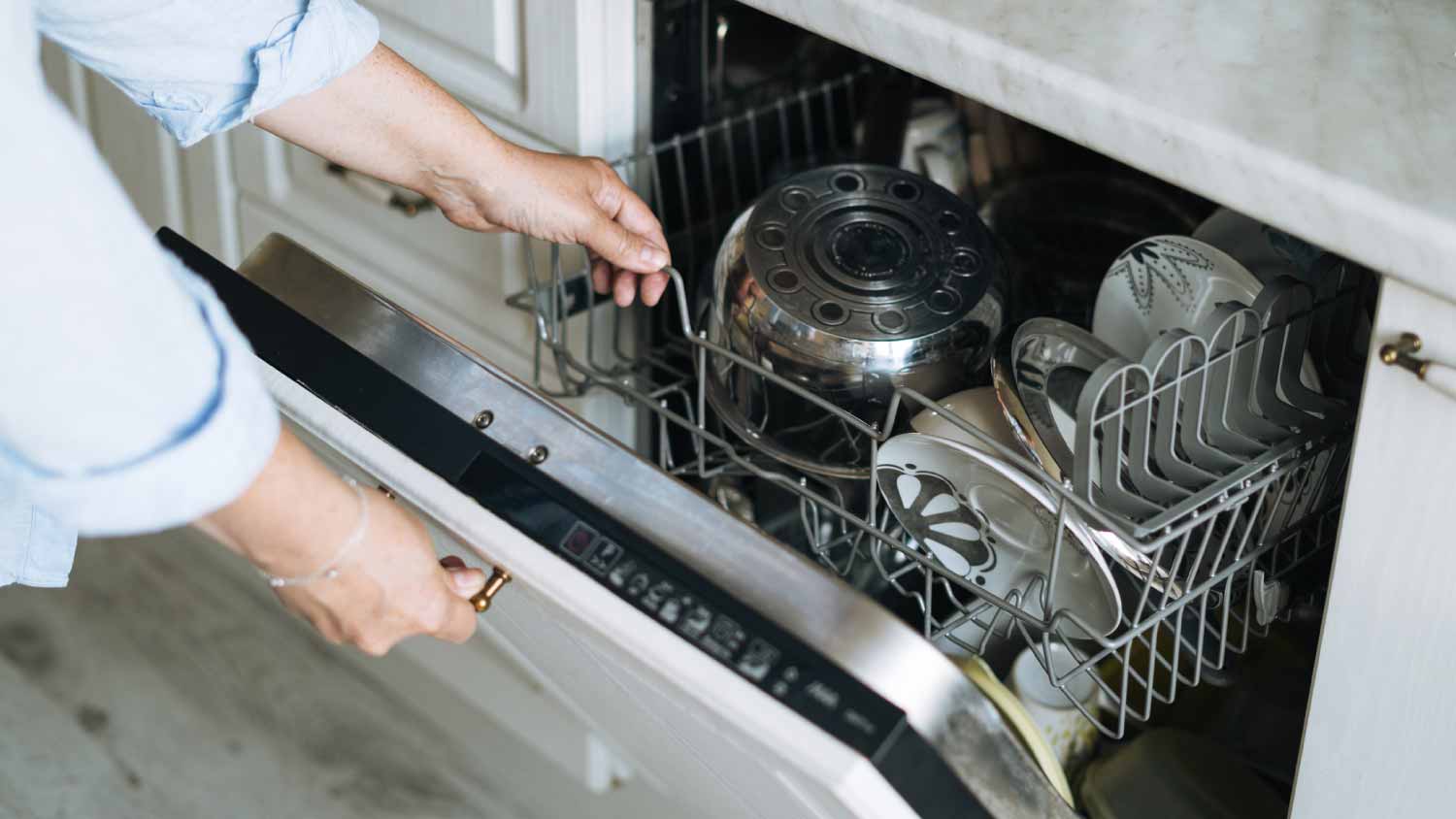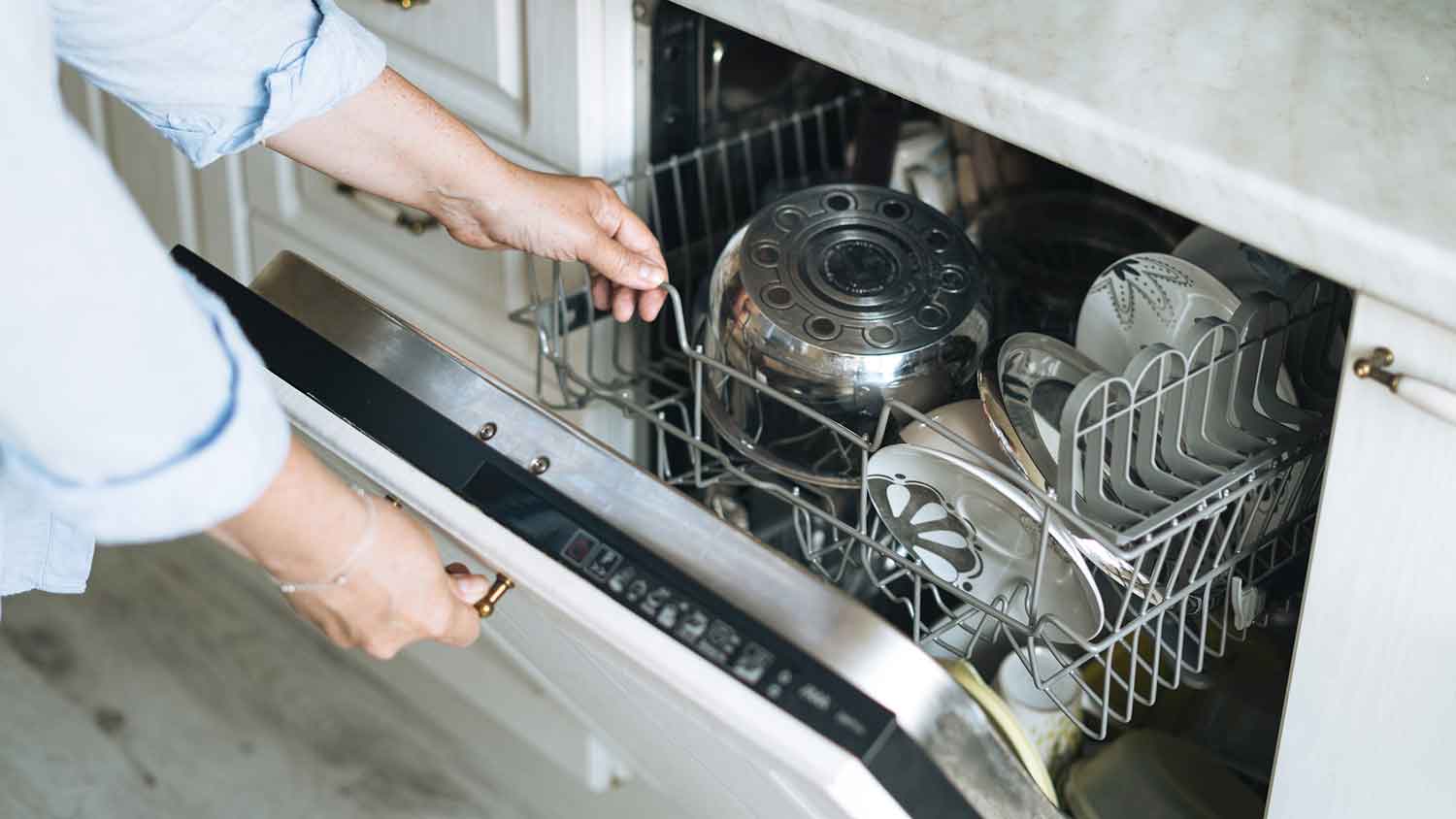Dishwasher vs. Handwashing: Cost, Water, Energy, and More
Answering the age-old question


Dishwashers save significant water, energy, and time compared to handwashing dishes.
You can save up to $465 a year on water and energy bills.
Dishwashers use hotter temperatures to clean more efficiently than handwashing.
There are pros and cons to both methods, particularly in small apartments.
Automatic dishwashers have been around for more than a century, and yet there is still a debate about whether they're more efficient than handwashing dishes yourself. Sure, dishwashers have come a long way since they were first invented, but the debate has gone on longer than expected—especially with the rise of eco-conscious models.
We're here to dispel confusion once and for all: Dishwashers use less water, even if you don't have an Energy Star dishwasher. Let's compare the energy, water, time, and financial stats to clear up this debate.
Pros and Cons of Using a Dishwasher vs. Handwashing

Let's take a moment to recap our stats and discuss some important details about the debate. After all, not all homes come equipped with a dishwasher, and not everyone will opt for the more expensive Energy Star model.
Dishwasher Pros and Cons
Not all homes come with a dishwasher or the appropriate plumbing to easily install one. If you’re on the fence about adding a dishwasher, here are some pros and cons.
| Pros | Cons |
|---|---|
| Saves time | Requires costly installation |
| Uses hotter water and drying temperatures for better sanitation | Requires ongoing maintenance and potential repairs |
| Energy savings | Average lifespan of 10–20 years |
| Variety of models to fit your budget | Not all items are dishwasher safe |
Handwashing Pros and Cons
Even if you own a dishwasher you may find yourself having to handwashing some dishes. If you find yourself re-scrubbing your dishes after running a load, you may need to clean your dishwasher or consider replacing it.
| Pros | Cons |
|---|---|
| Wash delicate items without damage | More time |
| Handle small loads quickly | More water and energy use |
| Better control over cleaning | Sponges can harbor bacteria |
Dishwasher vs. Handwashing Compared

Rinsing a few dishes under the faucet and popping them on the drying rack may feel like a no-brainer. How much water and energy could you possibly use in such a short time? And does it offset the cost of installing a dishwasher?
When you compare the numbers, there's really no debate on the subject. Keep in mind that the stats below consider proper dishwasher use—which means you do not need to rinse your dishes before putting them on the rack. You only need to remove food scraps.
Water Usage: Dishwasher
| Dishwasher In Gallons Per Load | Handwashing In Gallons Per Load |
|---|---|
| 3.5–15 (depending on model) | 9–27 |
The largest discrepancy between handwashing dishes and running a load in the dishwasher comes down to water usage. According to The Alliance for Water Efficiency, Energy-Star dishwashers use about 3.5 gallons of water per cycle while older models use between 10 to 15 gallons.
While this is still quite a wide range, it is nothing compared to the amount of water used when washing dishes by hand. Kitchen faucets use between 1.5 to 2 gallons of water per minute, which means you'll surpass other dishwasher estimates with just a pile of coffee cups. On average, dishwashing uses between 9 to 27 gallons, but this widely varies based on washing methods—unlike dishwashers, which are the same every time.
Energy Usage: Dishwasher
The Environmental Protection Agency (EPA) notes that washing dishes by hand adds up to double the energy used as using the dishwasher, but there are things you can do to ensure peak performance. For example, always make sure that you run the dishwasher with a full load to get the most out of the electricity and hot water that you do need.
Energy Star dishwashers may also use special sensors and efficient jets to wash each dish as much as it needs. To save even more electricity, you can also skip the heated dry cycle. Most dishwashers use hot enough water that it will evaporate on its own once you open the door.
Operating Cost: Dishwasher
So how does this truly affect your wallet? Yet again, the EPA has the numbers at the ready. If you have an Energy Star dishwasher, expect to save an average of $465 a year in water and energy bills compared to washing by hand. This is yet another reason not to rinse your dishes before putting them in the machine—you would essentially offset the cost, energy, and financial savings in the process.
Since the average cost of a dishwasher and installation is $970, the machine pays for itself in two years, especially if you hire an experienced local dishwasher installer that does it right the first time.
Time: Dishwasher
While no one loves unloading the dishwasher, it still beats the soak, scrub, and drying process necessary for the old-fashioned method. The EPA estimates a household saves 10 days a year using an efficient dishwasher compared to doing it all by hand.
Cleanliness: Dishwasher
Even if you're thorough at soaking and scrubbing, sanitizing dishes can be tricky by hand compared to a dishwasher. Dishwashers reach temperatures between 140 and 145 degrees Fahrenheit, far hotter than even your gloved hands can manage. Throw a dirty sponge in the mix, and there's no competition against dishwashers.
Effect On Dishes: Handwashing
Here's the one place where handwashing majorly pulls ahead of the pack. Even if you run a gentle cycle, there are generally a few things you should never put in a dishwasher. High-quality knives, wooden cutting boards and utensils, non-stick pots and pans, and hand-painted glass or ceramics. For items that can't go in the dishwasher, consider soaking them before rinsing so you don't have to keep the water on too long to remove those stuck-on foods.
Things to Consider Before Buying a Dishwasher

If you're ready to reduce your water usage, there are some factors to consider before investing in a dishwasher if you don't already have one. Finding space in your kitchen is going to be your largest concern. Dishwasher sizes vary, with the option of compact models suitable for small apartments to larger units ideal for spacious kitchens. You'll need to know how to measure a dishwasher to get the most accurate measurements of the designated area. This necessary step will prevent any post-purchase surprises and ensure seamless integration into your kitchen layout.
When installing a dishwasher in a home without one, know that some construction will be required. You may need to remove some cabinets, which will reduce your current cabinet space, and you'll need some plumbing work to make room for all the necessary dishwasher hook-ups.
Above all, you want a dishwasher that meets your household needs, so consider the capacity you require. If you have a large household, opt for a dishwasher with adjustable racks and ample space to accommodate numerous dishes. But, if you live alone or have limited space, a compact model might suffice. Contemplate the features and technology that align with your lifestyle as well, such as the variety of cycle options or smart technology features.
If you're strongly committed to reducing waste, look for dishwashers with Energy Star certification. These energy-efficient dishwashers are designed to consume less water and electricity, reducing both your environmental impact and utility bills. Energy-efficient models might have a slightly higher initial cost, but the long-term savings are well worth it.





- Appliance Repair Companies
- Washing Machine Repair
- Dryer Repair
- Refrigerator Repair
- Dishwasher Repair
- Oven Repair
- Wood & Pellet Stove Repair
- Freezer Repair Services
- Wood Stove Services
- Gas Stove Repair
- Emergency Appliance Repair Companies
- Ice Maker Repair
- Gas Appliance Repair
- GE Appliance Repair
- GE Refrigerator Repair
- GE Dryer Repair
- GE Dishwasher Repair
- GE Washing Machine Repair
- Samsung Appliance Repair
- Samsung Refrigerator Repair
- Samsung Dryer Repair
- Samsung Washer Repair
- Samsung Dishwasher Repair
- Samsung Oven Repair
- Whirlpool Repair
- Whirlpool Refrigerator Repair
- Whirlpool Washer Repair
- Whirlpool Dryer Repair
- Whirlpool Oven Repair
- Maytag Appliance Repair
- Maytag Refrigerator Repair
- Maytag Washer Repair
- Maytag Dryer Repair
- Maytag Dishwasher Repair
- Kitchenaid Appliance Repair
- Kitchenaid Oven Repair
- Kitchenaid Refrigerator Repair
- Kenmore Appliance Repair
- Kenmore Dishwasher Repair
- Kenmore Washer Repair
- Kenmore Dryer Repair
- LG Refrigerator Repair
- Bosch Appliance Repair
- Kenmore Refrigerator Repair
- LG Appliance Repair Services
- GE Microwave Repair
- Electrolux Appliance Repair
- Electrolux Washer Repair
- Kitchenaid Dishwasher Repair Services
- Wood Stove Inspection
- Dishwasher Installation
- Trash Compactor Repair
- Do Dishwashers Save Water? Why You Should Wash Your Hands of Handwashing
- Ultimate Dishwasher Buying Guide
- Do Dishwashers Use Hot Water?
- 5 Types of Dishwashers and How to Choose One For Your Home
- Why Your Dishwasher Is Not Filling Up With Water and What to Do
- How to Clean a Moldy Dishwasher
- Parts of a Dishwasher: Learn What They Are and How They Work
- Why Your Dishwasher Won’t Turn On and What to Do About It
- What Is a Portable Dishwasher?
- What Is a Dishwasher Air Gap?










